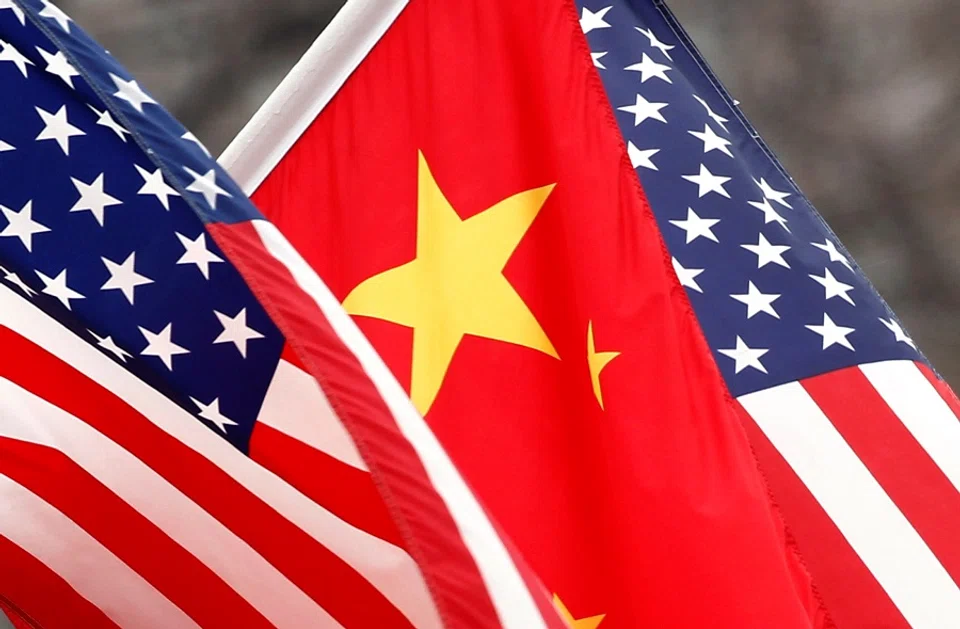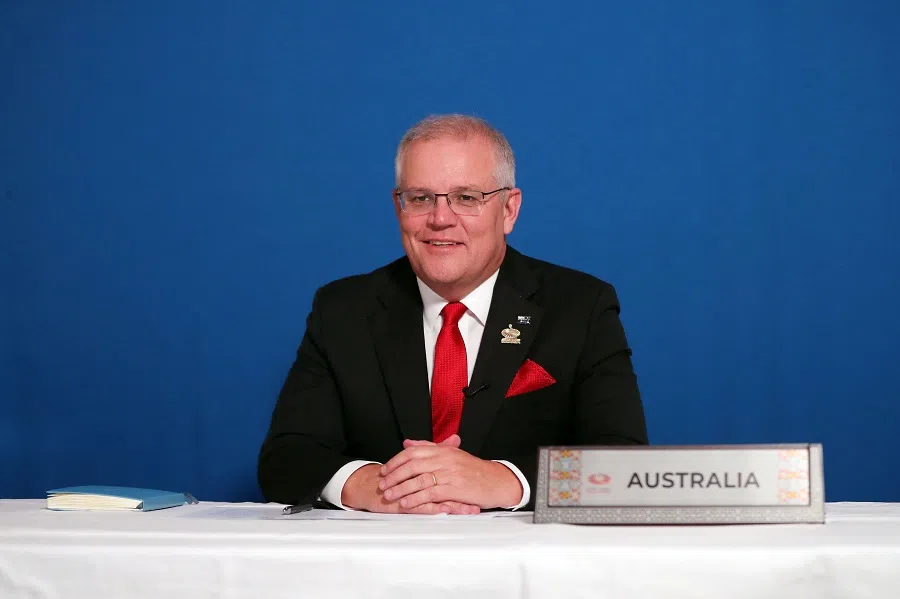'Relying on the US for security and China for economic benefits is absurd'
From China's perspective, Australia has been trying to have its cake and eat it too by seeking to rely on the US for security and China for economic benefits. If recent frictions are anything to go by, this balancing act is fraught with contradictions. Will Australia and other countries start to see that the Asia-Pacific's interests are best served by both China and the US having a stake in the security and economic well-being of the region?

Undoubtedly, Australia has provoked the ire of China in recent years. In fact, many say that China-Australia relations are at their lowest point in the last 50 years. It is clear that China, usually low-key and restrained in handling state-to-state relations, will no longer stay silent or be tolerant. Chinese foreign ministry spokespersons have repeatedly attacked Australian soldiers for their violent acts in Afghanistan. State media The People's Daily has criticised Australia in an article signed off as "Zhong Sheng" (钟声), while other Chinese media platforms are following this issue closely, and netizens are expressing their fury on Weibo.
Australia has also not gotten the level of international support it was expecting. Mired in domestic problems after the presidential election, the US has little time or energy to support Australia, even if the latter has been the staunchest supporter of its containment policy against China in recent years. Other Western allies such as France and New Zealand issued statements without much effect. Besides, these countries have no intention of giving up the Chinese market.

With Chinese demand for Australian minerals and agricultural products sectors turning cold, other countries are quickly stepping in to seize new-found opportunities. Even the Canadians have made their move: a Canadian resources enterprise has said that it is increasing its export of coking coal to China next year on account of China's restrictions on Australian coal imports.
In recent years, the Australian government led by Prime Minister Scott Morrison has followed the US in hardening its stance against China, to its own detriment and much damage to its economy. The Covid-19 pandemic has already dealt a big blow to Australia's economy - a decline in its exports to China could lead to an even higher unemployment rate. Morrison is painfully aware of this and has recently adjusted his stance towards China.
For example, he lauded China for its poverty alleviation achievements and said that Australia desires an "open, transparent and mutually beneficial relationship with China". He even expressed that Australia has its own sovereign interests and values to uphold and is not blindly following the US in containing certain countries. However, these verbal "concessions" were not immediately accepted by China. Evidently, the latter still wants to keep a close watch on Morrison's speech and behaviour.
Hoping to have their cake and eat it too
The Morrison administration's miscalculation stems from the strategic myth of "relying on the US for security and China for economic benefits" under US-China competition. On one hand, Australia wants to maintain economic and trade ties with China and have a share of China's pie; on the other hand, it also wants to strengthen political and military ties with the US under the pretext of "common values", and actively cooperate with the US in containing China to stay under the umbrella of America's protection. This dual strategy supposedly gives Australia a bargaining chip. It could negotiate and demand economic concessions from China as the latter seeks to alleviate the geopolitical and security pressures placed on it in the areas of politics and military.
... these are short-sighted and expedient moves by politicians who only want to temporarily gain stability and benefits from China and the US. Such strategies lack foresight and do not take into account the long-term development of the Asia-Pacific region.

Relying on the US's security presence and China's economic presence is not the strategic vision of the Morrison administration alone. It is also the modus operandi of some Asia-Pacific countries, just that they have not gone as far as the Morrison administration. On the surface, this strategy allows Asia-Pacific countries sandwiched between China and the US to obtain benefits from both sides whilst performing a balancing act. In this way, they are able to fall back on both China and the US, and maximise gains for their own interests.
In actual fact, however, these are short-sighted and expedient moves by politicians who only want to temporarily gain stability and benefits from China and the US. Such strategies lack foresight and do not take into account the long-term development of the Asia-Pacific region. With time and the rapid evolution of the regional structure, they will soon discover that there are many complexities involved and be unable to continue on this path for long.
Security and economy go hand in hand
Truth be told, security and economy are inseparable. The US wants to contain China mostly because of its needs to shore up and expand its economic interests as it does not want China to challenge its economic hegemony. Besides, a huge amount of resources is also needed to put pressure on China on the security front, and this requires great economic support. Thus, as early as the Obama administration's "rebalance towards Asia-Pacific" strategy was proposed, security and economy have gone hand in hand: in terms of security, the US concentrated more than 60% of its military in the Asia-Pacific region; in terms of the economy, it attempted to construct a Trans-Pacific Partnership Agreement that excluded China.

Thus, if certain Asia-Pacific countries want to rely on the US for security, the US will definitely demand that they remain allies of the US on the economic front. The Trump administration blatantly did so: it demanded more money from its allies South Korea and Japan for hosting US troops. It did not go easy on them on economic and trade issues either, and this was even more so with other Asia-Pacific countries.
Compared with the US, China is more open in this regard - it can somewhat tolerate the approach of relying on the US for security while partnering China for economic benefits if the former means that the US would provide the region with public goods for counterterrorism efforts etc, thereby safeguarding the stability of the international order. In fact, China would be happy to rely on the US for its security, and was once called a "free rider" by the Obama administration for that. China needs a stable and harmonious external environment, especially in its vicinity, to quickly solve its internal problems. Moreover, it adopts what it calls an "independent foreign policy of peace" and does not intend to compete with the US for hegemony. Hence, in terms of various security issues such as global counterterrorism and peacekeeping, China had once actively cooperated with the US. The approach of relying on the US for security is generally acceptable to China.
However, when the US's aims are no longer combating global terrorism and maintaining national peace and regional stability, but safeguarding its own interests and hegemony to the point of messing up regional frameworks and threatening China's security by frequently flexing its military muscle in the South China Sea and Taiwan, it is no longer possible for China to rely on the US for security.
China will not accept separate security/economy allegiance
In such a scenario, China would have zero tolerance for countries in the region relying on the US for security because if these countries actively accommodate the US's containment strategy in the political and military aspects, they would essentially become the pawns and accomplices of the US's containment strategy. If that happens, and China continues to satisfy their economic demands, China would be losing more than it gains. Not only would this be hard to accept on an emotional level, it would also be difficult for China to continue its actions on a practical level: if China is unable to guarantee its own security, how can it protect its economic interests? Hence, under such circumstances, it is impossible for China to agree with the approach of relying on the US for security and China for economic benefits.

From a macro perspective, from the moment that the US began an all-round suppression of China out of strategic anxiety and destroyed regional stability and balance, it destroyed the environment for the peaceful development of the regional economy, and ultimately landed all countries in the region, including China and the US, in the plight of being neither secure nor economically sound. Under such circumstances, relying on the US for security and China for economic benefits is a fantasy and is completely untenable for countries in the region.
The behaviour of the Morrison administration is one such example. In terms of security, it tried its best to accommodate the US's suppression of China. By doing so, it actually fanned the flames and acted as an accomplice to the Trump administration's tough suppression of China, including condoning and supporting the Trump administration's increasingly hardened stance against China in the economic realm. Ultimately, this severely damaged global economic recovery, and made regional security and economic conditions more unstable. Australia is not spared from these damages as well.
Regional countries should not hope that a hegemonic power like the US would discount economic factors and grant them security for free. Neither should they expect China to sacrifice its own security rights and passively supply all their economic needs.
Thus, we cannot simply view China's recent counterattacks against Australia as an act of deterrence and an intentional punishment to warn the rest of the US's followers. Actually, this is just an inevitable response from China. It also makes clear to both China and the US that the concept of relying on the US for security and China for economic benefits is absurd. Asia-Pacific countries that hold on to this myth would only be harming others and themselves, bringing zero benefits to regional security and development.

The Asia-Pacific is the common home of all countries in the region. Thus, security and economic prosperity issues concern all countries. Only when the security and development rights of every country are respected and taken into account can various countries gain mutual benefits and win together. Regional countries should not hope that a hegemonic power like the US would discount economic factors and grant them security for free. Neither should they expect China to sacrifice its own security rights and passively supply all their economic needs.
Sandwiched between China and the US, Asia-Pacific countries should seek joint security, markets, and prosperity. Both China and the US have the responsibility and the right to contribute to regional security and prosperity. Any self-serving behaviour that messes with regional frameworks, ruins regional security, and forcefully severs regional markets should not be condoned.
Hence, there should be a place for both the US and China in managing security, and a place for both countries in economic development. Healthy competition between China and the US, as well as cooperation for mutual benefit, are not only in the interests of both countries, but will reap great dividends for the Asia-Pacific region.
Related: Exemplary punishment: How China's using wolf-warrior tactics on Australia to warn the rest | Australia boosting security relations with Southeast Asia and the US in the face of heightened threats | China-Australia relations: Downward spiral as Australia plays 'deputy sheriff' to the US? | Now more than ever, Southeast Asia values a firm American security presence


![[Big read] When the Arctic opens, what happens to Singapore?](https://cassette.sphdigital.com.sg/image/thinkchina/da65edebca34645c711c55e83e9877109b3c53847ebb1305573974651df1d13a)


